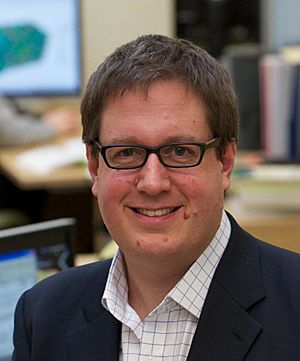Jason Reese facts for kids
Quick facts for kids
Jason Reese
|
|
|---|---|
 |
|
| Born |
Jason Meredith Reese
24 June 1967 |
| Died | 8 March 2019 (aged 51) |
| Nationality | British |
| Alma mater | University of Oxford (DPhil) Imperial College London (BSc) |
| Known for | Multiscale modelling Microfluidics & Nanofluidics Rarefied gas dynamics |
| Awards | Philip Leverhulme Prize MacRobert Award |
| Scientific career | |
| Fields | Mechanical engineering Aerospace engineering |
| Institutions | University of Edinburgh University of Strathclyde King's College London University of Aberdeen Technical University of Berlin University of Cambridge |
| Thesis | On the structure of shock waves in monatomic rarefied gases (1993) |
Jason Meredith Reese (born June 24, 1967 – died March 8, 2019) was a brilliant British engineering scientist. He was a special professor, called the Regius Professor of Engineering, at the University of Edinburgh.
He studied how tiny particles in liquids and gases move. This helped understand how fluids behave on a very small scale. He won several important awards for his work, like the Philip Leverhulme Prize and the Lord Kelvin Medal. Before Edinburgh, he was a professor at the University of Strathclyde in Glasgow.
Contents
Becoming an Engineer
Jason Reese first studied Physics at Imperial College London. He finished his degree in 1988.
Then, he went to the University of Oxford. There, he studied Applied Mathematics. He earned his Master's and PhD degrees in 1993. His research looked at how shock waves behave in very thin gases.
His Work and Discoveries
After his studies, Jason Reese started working in engineering. He did research at the Technical University of Berlin and the University of Cambridge. In 1996, he became a teacher at the University of Aberdeen.
Later, in 2001, he moved to King's College London. In 2003, he became a professor at the University of Strathclyde. He even became the head of the Mechanical & Aerospace Engineering Department there.
In 2013, he received a very important job. He became the Regius Professor of Engineering at the University of Edinburgh. This special position was created by Queen Victoria way back in 1868.
Studying Tiny Flows
Jason Reese was an expert in engineering science. He used computers and theories to study how fluids move. He was especially interested in multiscale fluid dynamics. This means looking at how fluids behave from very tiny parts (like molecules) all the way up to larger systems.
He focused on microflows and nanoflows. These are flows in extremely small spaces, like tiny channels. He also studied rarefied gas dynamics, which is about how gases move when they are very thin.
Helping Industries
Jason Reese also used his knowledge to help real-world problems. In 2002, he helped start a company called Brinker Technology Ltd. This company created a new way to find and fix leaks in oil and gas pipelines. It also helped with water pipes.
Giving Advice
From 2012 to 2016, Jason Reese was part of the Scottish Science Advisory Council. This group gives advice to the Scottish Government about science. He also advised the UK's Ministry of Defence on science and technology. He helped review recommendations for national honors too.
In 2018, he received a special 10-year award from the Royal Academy of Engineering. This award allowed him to research how to design things "from molecules to machines." He wanted to connect the tiny world of molecules to the design of large machines.
Jason Reese passed away suddenly on March 8, 2019, at the age of 51.
Awards and Special Recognitions
Jason Reese received many awards and honors for his important work:
- 2000: ExxonMobil Engineering Fellowship
- 2003: Philip Leverhulme Prize for Engineering
- 2004: Bruce-Preller Prize Lectureship
- 2005: Became a Fellow of the Institute of Physics
- 2006: Became a Fellow of the Institution of Mechanical Engineers
- 2006: Became a Fellow of the Royal Society of Edinburgh
- 2006: Was a finalist for the MacRobert Award for Innovation in Engineering
- 2011: Became a Fellow of the Royal Academy of Engineering
- 2015: Received the Lord Kelvin Medal
- 2016: Became a Fellow of the American Physical Society
- 2018: Awarded a Chair in Emerging Technologies

